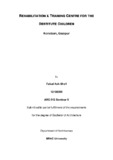| dc.contributor.author | Ash-Shafi, Faisal | |
| dc.date.accessioned | 2017-08-01T09:22:48Z | |
| dc.date.available | 2017-08-01T09:22:48Z | |
| dc.date.copyright | 2016 | |
| dc.date.issued | 2016 | |
| dc.identifier.other | ID 12108009 | |
| dc.identifier.uri | http://hdl.handle.net/10361/8379 | |
| dc.description | This thesis is submitted in partial fulfillment of the requirements for the degree of Bachelor of Architecture, 2016. | en_US |
| dc.description | Cataloged from PDF version of thesis. | |
| dc.description | Includes bibliographical references (page 77-79) | |
| dc.description.abstract | The rising issue of homeless children on the streets & children affected by extreme
poverty has outstretched to such levels that measures like sheltering & training them
has long been implemented in many places of our country. Such an institution is the
'Training & Rehabilitation Centre for the Destitute Children' in Konabari, Gazipur. The
children are taken in as young toddlers, & cared for until they are adolescents ready
to find some kind of work to keep their lives going. However, even though the care
given is no less than necessary, the way in which the whole organization operates
now does not always offer much choice to the children once they are of age to take
care of their own needs. This hugely owes to the lack of proper infrastructure to
facilitate that kind of learning & environment, & also accommodate the number of
children it could hold considering the amount of area the site of the institution has.
These children are in need for extra nurturing, & an environment that aid in such kind
of development. It is very important to understand that the needs & wants of these
children vary greatly from a child who comes from a well off family. Many of these
children go through severe mental trauma that affects their developmental
psychology, which is an important part of growing up to be a responsible person in
the society. However, the most significant problem remains to be the training &
education they receive, which determines their future. The core agenda of such an
institution lay fruitless if the children doesn't fit in & contribute to the rest of the society
when they no longer belong to this institution. This report therefore, focuses on such
special needs & wants, the proper kind of training & education, their integration with
the society & the making of such spaces that provide these. | en_US |
| dc.description.statementofresponsibility | Faisal Ash-Shafi | |
| dc.format.extent | 79 pages | |
| dc.language.iso | en | en_US |
| dc.publisher | BRAC University | en_US |
| dc.rights | BRAC University thesis reports are protected by copyright. They may be viewed from this source for any purpose, but reproduction or distribution in any format is prohibited without written permission. | |
| dc.subject | Destitute children | en_US |
| dc.subject | Gazipur | en_US |
| dc.title | Rehabilitation & training centre for the destitute children: Konabari, Gazipur | en_US |
| dc.type | Thesis | en_US |
| dc.contributor.department | Department of Architecture, BRAC University | |
| dc.description.degree | B. Architecture | |

